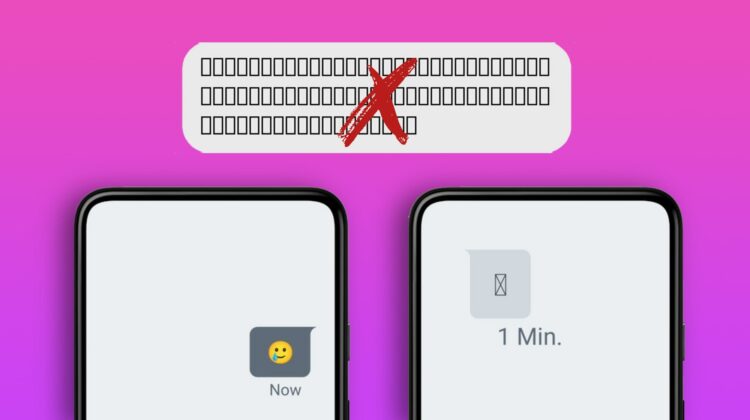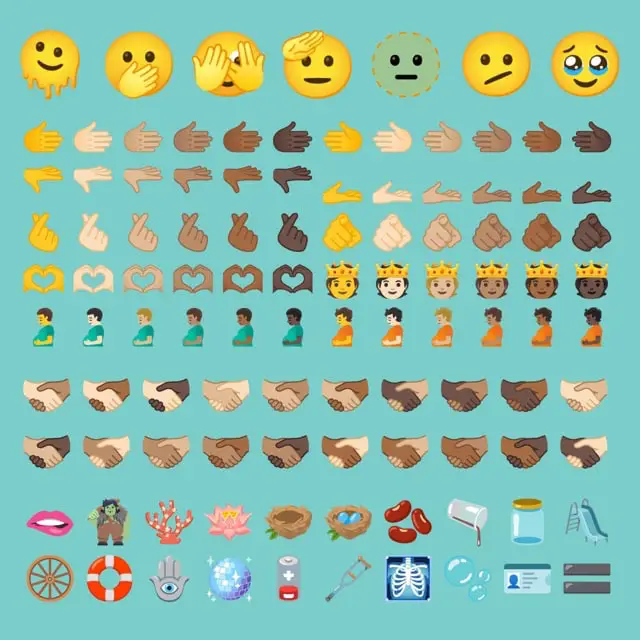
Have you ever received a text from a friend that included a string of unidentifiable black boxes where emojis should be? These black boxes are called “Tofu” and are the subject of a recent “Ask a Techspert” article on Google’s “The Keyword” blog that explains the reason why this happens and lays out the steps Google is taking to fix this issue for good.
Why are you seeing black boxes instead of emojis?
This issue has existed on Android and web apps for many years. In fact, despite Google being ahead of Apple when it added support for the latest emojis back in 2016 with the release of Android 7.0 (Nougat), 96% of Android users were still seeing those little black boxes in their texts.
The problem is that previously, new emoji updates were bundled with system updates, as fonts and the relevant Unicode support were provided at an OS level. The result was that users that did not have the latest version of Android or iOS would be left behind in many ways, one of which was to miss out on the latest emoji set.
As anyone who has used Android for any amount of time knows, most phone manufacturers are not particularly timely with pushing out OS updates. The issue is getting better, but it is still a problem that plagues the Android ecosystem. You could very well purchase the newest Android phone from manufacturer X and end up running an outdated version of Android, resulting from the fragmentation that occurs when you trust several manufacturers with the responsibility of pushing updates after taking their time adding their skin on different phone models. Thus, not all Android phones got the same OS update simultaneously.
This hasn’t been the case with iOS. Only iPhones run iOS, and all iPhones are manufactured by Apple, which also handles the distribution of system updates. Therefore, it is rare to come across an iPhone user who is not running the latest iOS update. Unless their phone is a very old model that no longer supports updates, their phone is completely out of space, or they are purposely refusing to take the update, most users are on the same version of the OS at any given time.
On web apps, the issue is also a result of more fragmentation. For example, Gmail had support for the same emoji set from 2008 through 2016 and then again from 2016 through 2021. That’s at least five years between updates, which resulted in Gmail not properly displaying emoji skin tone and gender variants. Of course, this would also be the case with any web app that made its own emoji rather than relying on the operating system.
What is Google doing to remedy this problem?
Starting this year, Google is decoupling emoji updates from operating system updates. This means that you can now have the latest emoji set without being on the newest version of your operating system. Google explains:
As of this month, all apps that use Appcompat (a tool that enables Android apps to be compatible with several Android versions) will automatically get the latest and greatest emoji so you can send and receive emoji even if you don’t have the newest phone.
The Keyword
Google relies on Noto Emoji, a set of 3,670 emojis that work across Google and its apps, so you can be assured that the latest emoji will appear on Android, Gmail, Google Meet, ChromeOS, etc. Android 12L is now using Emoji 14.0, which includes the new melting face, dotted face, and heart hands emoji.
Out of curiosity, I sent a melting face and heart hands emoji from my Pixel running Android 12 QPR3 to my colleague Michael Perrigo on Discord. What I saw on my Pixel, ChromeOS, and macOS was very different from what he saw on Windows 11. This is an example of how communication can break just by having one device that does not support the same Emoji set.


I think Google’s decision to decouple emoji from system updates is a step in the right direction, though, and goes a long way to simplify communication in this digital age. Even if you are not a fan of emojis or may think that communicating this way is lazy, there’s no denying that this shift in communication is happening no matter what. Google has acknowledged it, and it may be time for the rest of the world to do the same.
Join Chrome Unboxed Plus
Introducing Chrome Unboxed Plus – our revamped membership community. Join today at just $2 / month to get access to our private Discord, exclusive giveaways, AMAs, an ad-free website, ad-free podcast experience and more.
Plus Monthly
$2/mo. after 7-day free trial
Pay monthly to support our independent coverage and get access to exclusive benefits.
Plus Annual
$20/yr. after 7-day free trial
Pay yearly to support our independent coverage and get access to exclusive benefits.
Our newsletters are also a great way to get connected. Subscribe here!
Click here to learn more and for membership FAQ



